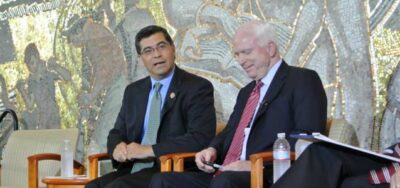Legislation

Pressure Mounts on House To Tackle Immigration Reform
As July comes to a close and August recess begins, prospects for immigration reform in the House of Representatives are looking up. While some saw the pronouncements from House Judiciary Chairman Bob Goodlatte (R-VA) and Speaker John Boehner (R-OH) that the House would not take up the Senate bill as a death knell, it looked more like a bargaining position by the end of the month. “We’re doing it differently in the House,” Goodlatte told Fox Business. Members are still divided about what immigration measure they should consider. Options range from several piecemeal bills—possibly including a limited version of the DREAM Act that House Majority Leader Eric Cantor (R-VA) is crafting with Goodlatte—or a comprehensive measure on which seven members are still working. So while the House is not going to meet Boehner’s original goal of passing some form of immigration reform by the end of July, the issue is far from dead. Read More

Letter from Business Urges Congress to Create a 21st Century Immigration System
As an increasing number of organizations voice their support for comprehensive immigration reform, the business community added theirs this week through a letter to Congress. Business now joins a broad swath of the American public that wants Congress to pass immigration reform. The letter sent to Members of the U.S. House of Representatives represents a nationwide coalition of 420 companies and includes business and industry associations and state and local chambers of commerce. It encourages Members of Congress to enact legislation that would repair and modernize our immigration system and comes on the heels of other similar efforts by higher education administrators, faith groups, faculty and scholars, non-profits, and other coalitions. Read More

Why Citizenship Matters in Immigration Reform
As the August recess approaches, the debate surrounding immigration reform and citizenship will shift away from Washington and into town hall meetings and events in local communities. In anticipation of this, today the AFL-CIO hosted an event on citizenship featuring among others, Senator John McCain (R-AZ) and Representative Xavier Becerra (D-CA). Both men emphasized the importance of recess town halls as opportunities for lawmakers to discuss immigration reform with their constituents. Sen. McCain said he plans to tour Arizona over the recess and take the pulse of his constituents. Both McCain and Becerra were optimistic however. McCain emphasized the broad public support for the pathway to citizenship, sharing polls that show that well over 70% of the American people think immigration is good for our Country and Rep. Becerra reiterated the need for full citizenship by saying “I don’t think this country is ready to go back to the 20th or 19th century where we have a second class of citizens.” Read More

The Immigration Debate Could Use a Healthy Dose of Facts
Immigration is sure to be a hot topic when Members of Congress meet their constituents face-to-face during the upcoming summer recess. The full Senate has passed a comprehensive immigration reform bill that includes a controversial “border surge” as well as a path to citizenship for unauthorized immigrants already living in the United States; the House Committee on Homeland Security has passed an enforcement-only border bill that doesn’t even acknowledge the other components of immigration reform; and there continues to be much heated public debate about what the House will do next and whether the reform effort will survive the vagaries of partisan politics. As politicians and voters attempt to wade through all of the thorny issues that are raised by the topic of immigration reform, and as journalists attempt to report on these many complex issues, there is something which should be kept front and center: facts. Read More

Steve King’s Tall Tales About Immigrants and Crime Don’t Add Up
There is no denying that Rep. Steve King (R-IA) has a vivid imagination. As he sits in Border Patrol vehicles at night, he apparently sees hundreds of DREAM Act-eligible drug mules with muscular calves hauling heavy loads of marijuana across the border. How does he know these drug mules would meet the rather stringent criteria for legalization under the DREAM Act? Hard to say. How does he know these drug mules outnumber their valedictorian counterparts by a ratio of one hundred to one? No one can say. What is certain is this: when it comes to the topic of immigration and crime, nativists like King have no need for facts when there is so much fear and innuendo at their disposal. Perhaps this is because the facts are so stacked against them. Read More

Hearing Highlights Similarities Between Senate Immigration Bill and House Border Bill
Ostensibly, the July 23rd hearing of the House Homeland Security Subcommittee on Border and Maritime Security was about the many differences between the Senate’s immigration-reform bill and the House’s border-enforcement bill. The hearing was even titled “A Study in Contrasts: House and Senate Approaches to Border Security.” However, while highlighting very real differences between the House and Senate approaches to immigration reform, the hearing inadvertently shed light on the many similarities between the two when it comes to border security. Both pieces of legislation embrace possibly unworkable border-enforcement goals that have more to do with unauthorized immigration than with the primary threats to border security: the transnational “cartels” that smuggle people, drugs, guns, and money in both directions across the border. Read More

An Unlikely Couple: The Similar Approaches to Border Enforcement in H.R. 1417 and S. 744
The House of Representatives and the Senate have embarked upon very different paths when it comes to immigration reform. On June 27, the Senate passed a comprehensive immigration reform bill—S. 744 (the Border Security, Economic Opportunity, and Immigration Modernization Act)—that seeks to revamp practically every dysfunctional component of the U.S. immigration system. The House leadership, on the other hand, favors a piecemeal approach in which a series of immigration bills are passed, each addressing a different aspect of the larger immigration system. To date, the most popular of these piecemeal bills has been H.R. 1417 (the Border Security Results Act), which was passed unanimously on May 15 by the House Committee on Homeland Security. H.R. 1417 is, in marked contrast to S. 744, an enforcement-only bill which does not acknowledge the existence of any other component of immigration reform. Nevertheless, the border-enforcement provisions of S. 744 aren’t all that different from those contained within H.R. 1417. Both bills share the arbitrary and possibly unworkable goals of “operational control” (a 90 percent deterrence rate) and 100 percent “situational awareness” along the entire southwest border. The Senate bill also added insult to injury in the form of the Corker-Hoeven (“border surge”) amendment, which seeks to micromanage border-security operations and would gratuitously appropriate tens of billions of dollars in additional funding, and hire tens of thousands of additional Border Patrol agents, before the Department of Homeland Security (DHS) has even determined what resource and staffing levels are needed to do the job. Read More

Opposition Builds To Limited Proposal That Would Offer Citizenship Only To DREAMers
So far, House leaders have considered providing an opportunity for citizenship only to undocumented immigrants who arrived in the U.S. as children, often known as DREAMers. Majority Leader Eric Cantor (R-VA) and Judiciary Committee chairman Bob Goodlatte (R-VA) confirmed earlier this month that they are working on a bill, called the KIDS Act, to create a road to citizenship for some DREAMers. "These children came here through no fault of their own and many of them know no other home than the United States,” Goodlatte said in a statement. Read More

Immigration Reform an Imperative for Cities and Metropolitan Areas
Metropolitan leaders from around the country made the case for immigration reform at an event hosted by the Brookings Institution’s Metropolitan Policy Program today. Over 80 percent of the U.S. population, including 95 percent of immigrants, now live in metropolitan areas; cities and towns across the country therefore have a huge stake in passing immigration reform. In fact, panelists agreed that comprehensive immigration reform is an imperative for metropolitan areas. “We need an immigration system that is keeping with the times,” stated Audrey Singer, a Senior Fellow with Brookings. Read More

Faith Groups Make The Religious Argument For Immigration Reform
As the focus on immigration reform turns to the House of Representatives, faith leaders continue to push for members of Congress to support a comprehensive measure to improve immigration policies. In late May, evangelical groups launched a $250,000 national ad campaign that featured pastors urging people to support congressional immigration reform efforts. And after the Senate passed S. 744, four religious organizations sent letters to House members pushing them to act on comprehensive immigration legislation. Read More
Make a contribution
Make a direct impact on the lives of immigrants.
